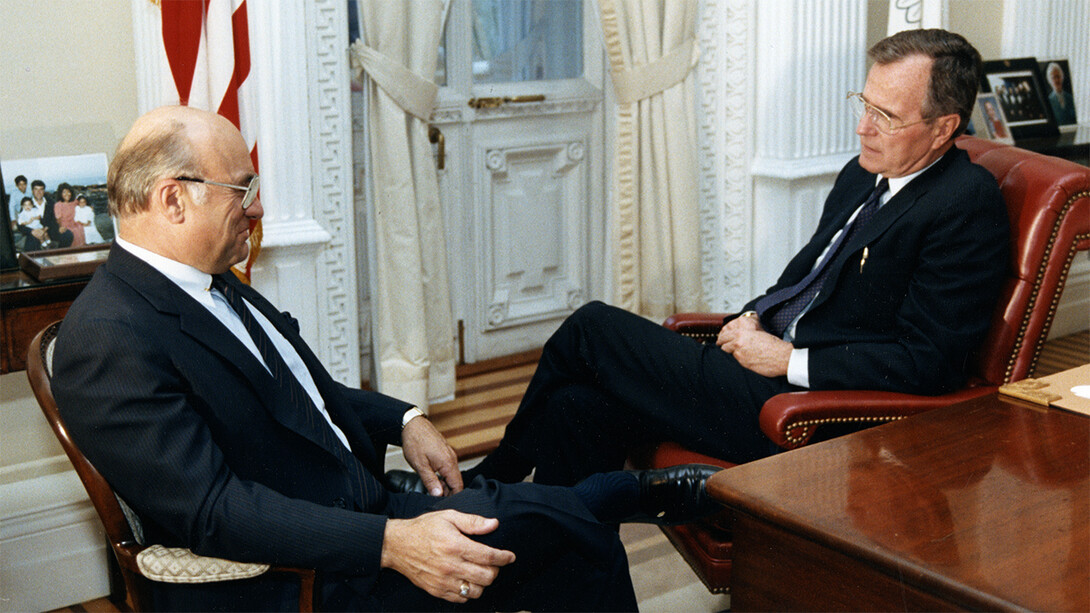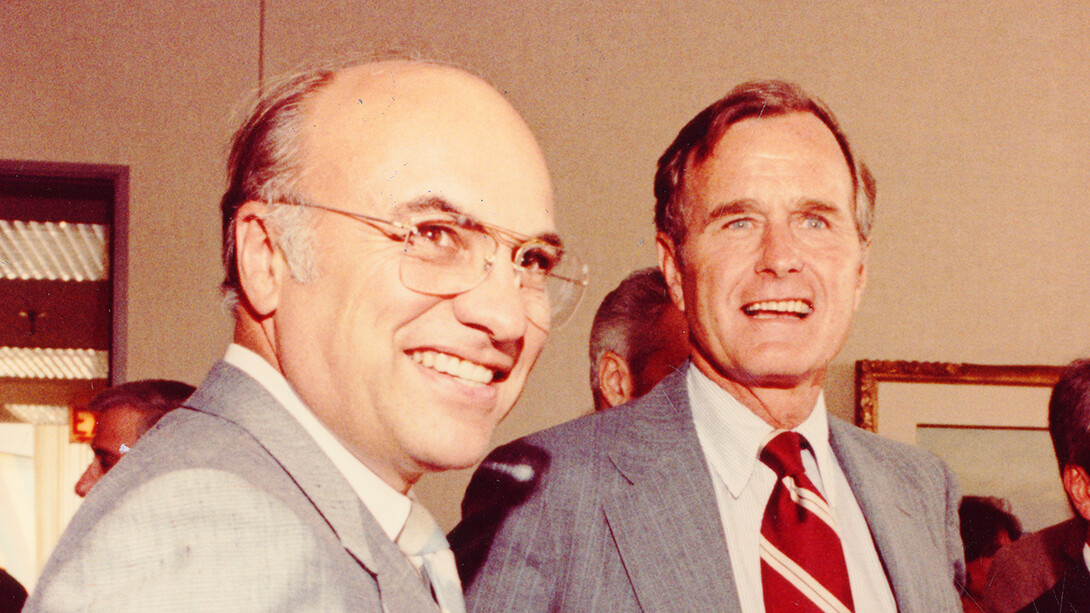
EDITOR’S NOTE — As the nation pauses to honor the legacy of President George H.W. Bush, Nebraska Today is looking back at the 41st president’s impact on the University of Nebraska–Lincoln. In this story, we examine Bush’s friendship with — and reliance on — Nebraska alumnus Clayton Yeutter. See complete coverage of Nebraska Today’s Remembering 41 series.
As 1988 neared an end, University of Nebraska–Lincoln alumnus and benefactor Clayton Yeutter was finishing a nearly four-year stint as U.S. trade representative for President Ronald Reagan.
Yeutter, having survived the “busy, hectic, demanding years” of 18-hour days that included negotiating the precursor to the North American Free Trade Agreement, or NAFTA, anticipated returning to the private sector.

“Then President Bush threw a monkey wrench in the works by asking if I would continue in his administration,” Yeutter said in a 2001 oral history of the Bush presidency.
Yeutter had met George H.W. Bush in the early 1970s, when the former was assistant secretary of agriculture and the latter served as the U.S. envoy to China. They became easy friends, as many who met Bush tended to do, Yeutter said. And they remained close by way of shared social circles and, later, cabinet meetings under President Reagan.
When Bush himself became the newest resident of 1600 Pennsylvania Avenue, he realized that he needed someone he could trust to navigate the next U.S. farm bill, a course-setter for the nation’s agricultural policy.
“He came to me and said, ‘I really need help in this area. This could be a real trouble spot in the administration, and I want somebody I can rely on to get me through that battle,’” Yeutter recounted.
Yeutter, by then a veteran negotiator and policy expert, knew well the potential pitfalls and pratfalls that lay ahead. But he agreed to become the U.S. secretary for agriculture until the farm bill was passed in 1990.
“I probably would not have taken that on for anyone other than President Bush,” he said.
Yeutter set out to get ahead of the notoriously brutal negotiations with Congress. His plan: develop a comprehensive “green book” containing detailed farm bill recommendations in the hope of directing the debate rather than reacting to it.
“We went from A to Z with everything we could think of that would be debated in the farm bill, not only on farm policy but also on environmental policy, food stamps and everything else that might be included,” Yeutter said of the book, which was roughly 3 inches thick. “We sent it to everybody on both the Senate and House agriculture committees, and to all the agriculture lobbyists around Washington, D.C.
“It went out to all the major farm organizations. It went out to all the farm media. It hit like a bolt of lightning, for nobody had ever done anything quite like that before.”
The proactive approach worked, yielding more of Yeutter’s favored market-driven policies while hewing to budgetary constraints. But his work in Washington, and his service to President Bush, weren’t quite done. In early 1992, he became Bush’s counselor for domestic policy until the president left office early the following year.

Many of the principles and strategies that the late Yeutter employed on behalf of Presidents Bush and Reagan will be taught to Nebraska students at the university’s Yeutter Institute of International Trade and Finance.
“Clayton Yeutter had boundless confidence in the potential for Nebraska students to play leadership roles in a changing world,” said Jill O’Donnell, the institute’s inaugural director. “Our goal is to build an institute worthy of his legacy.”
Yeutter and his wife Cristy helped establish the institute with a $2.5 million donation that was matched by the Nebraska legislature and supplemented with private gifts. The institute spans law, business and agriculture in a manner befitting Yeutter, who earned a bachelor’s from Nebraska’s College of Agriculture, a juris doctor from its College of Law and a doctorate in agricultural economics.
“Clayton is tough as nails, knowledgeable, energetic and a friend of agriculture,” Bush wrote in a 2015 letter to now-Chancellor Ronnie Green. “I have no doubt that future generations of students will greatly benefit from the creation of this new institute and will be able to continue Clayton’s legacy of being a game-changer in the area of trade and finance. With any luck, this institute will help to shape the next USDA secretary of agriculture.”







